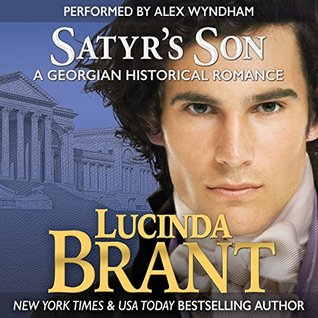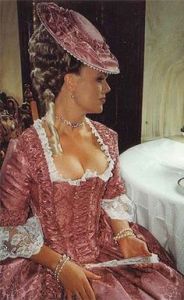
(Rockliffe, #6)
Genre: Historical Romance (Georgian – 1778)
Cover Blurb:
The performance finished in a flourish of technical brilliance and the young man rose from the harpsichord to a storm of applause.
Julian Langham was poised on the brink of a dazzling career when the lawyers lured him into making a catastrophic mistake. Now, instead of the concert platform, he has a title he doesn’t want, an estate verging on bankruptcy … and bewildering responsibilities for which he is totally unfitted.
And yet the wreckage of Julian’s life is not a completely ill wind. For Tom, Rob and Ellie it brings something that is almost a miracle … if they dare believe in it.
Meanwhile, first-cousins Arabella Brandon and Elizabeth Marsden embark on a daring escapade which will provide each of them with a once-in-a-lifetime experience. The adventure will last only a few weeks, after which everything will be the way it was before. Or so they think. What neither of them expects is for it to change a number of lives … most notably, their own.
And there is an additional complication of which they are wholly unaware.
The famed omniscience of the Duke of Rockliffe.
♥♥♥♥♥♥
After five books in her fabulous Rockliffe series, Stella Riley is finally (and sadly) bringing the series to a close.
But what a swan song! CADENZA has two compelling love stories at its centre. And who knew that, as well as being an historian (English Civil War – more about that later) of some considerable repute, she is also a knowledgeable and talented musician who has quite simply astounded me with her scholarship, research, and personal knowledge of the world of classical music, and in particular, the harpsichord?
I am a huge fan of this author who is both an eloquent and creative writer, and each time we are treated to a new book there is never any danger of repetition. Cadenza is a feast for the senses and it’s a treat worth waiting for – from the first page to the last. Each book in the Rockliffe series is quite unique, apart from the ever-present, but fascinating characters who have each had their own stories told in preceding books and who are always in evidence and add something extra special as the series progresses.
Cadenza centres around the world of music with the main character, Julian Langham, being a gifted and supremely talented, harpsichordist – a virtuoso in fact. Julian’s character is unlike any other I have ever encountered in Historical Romance. Since he was old enough to reach a keyboard, he has studied and played almost to the exclusion of all else and was destined to be a musician. At the age of twenty-eight and just teetering on the brink of his career, his world of playing and composing is brought to an abrupt halt by a disreputable firm of lawyers who con him into putting his career on hold ‘briefly’ and leaving Vienna to return to the country of his birth to take responsibility for a crumbling, debt ridden estate, and an earldom he neither wants nor even knew he was heir to, so obscure was his claim.
Having lived in the world of music for most of his life, suddenly being faced with the reality of being responsible for his predecessor’s three feral illegitimate offspring and his bewildered tenants, and with debts and problems he cannot ever hope to meet or solve, has the effect on him of being doused by a bucket of cold water, especially when he realises there is no going back. The only tiny (and it is minute) light is a badly abused harpsichord which has been left in a sadly neglected state and is in pieces in the library. At the end of each long, hard day toiling on the estate, Julian begins to painstakingly restore it. Not only is Stella Riley a musician, but she has also carefully researched – with quite remarkable understanding – the inner workings of this instrument which shows in the terminology she uses as she describes Julian slowly beginning to restore it to working order.
Julian may be gentle and slightly vague but he has an honestness, as rigid as a streak of iron, running through his backbone and, although he may not know what to do, he can’t be faulted for failing to do his best – rolling up his sleeves and working alongside his tenants – all the while slowly dying inside without his beloved music to sustain him. His obvious integrity and his determination not to increase rents, even though he desperately needs the money, earns him the respect of the locals and his tenants, not least the local doctor and his wife who befriend and help him as he flounders from one crisis to another. The children, whom he has tracked down and ensconced in the dilapidated nursery, are in turns angry and mistrustful, apart from the youngest, Ellie, who simply accepts him at face value. Tom and Rob are older, and Tom in particular – the twelve-year-old, self-elected protector of the threesome – doesn’t trust his motives. Why should Julian want them? No one has ever cared or wanted them before. Watching him win the boys’ trust, especially Tom’s, is heart-warming. Julian doesn’t employ artifice, he doesn’t know how to – he’s simply himself. In fact, it is his wholly innocent and sincere attitude in his dealings with the children which highlights the kind of man he truly is.
The doctor and his wife realise that Julian needs help, especially with the children and the running of his home, so they propose he employs a housekeeper-cum-governess and set about advertising for a suitable candidate. Elizabeth (Lizzie) Marsden, who wishes to help her family out financially, applies and, after some correspondence, in which she infers a greater age and experience than she has, is offered the position for a trial period. No-one could predict the outcome this action precipitates – a series of events, which once set into motion, escalates and forever changes Julian’s life and those of the children.
Meanwhile another drama is playing out at the home of Arabella Brandon, youngest of the four siblings at Brandon Lacey, where Arabella (Belle) has received the news that she has been jilted, after a three-year betrothal to her soldier fiancé who has not returned from the Colonial wars, instead marrying and settling in America. Her family, in particular her mother, want her to go to London for the season and she is reluctant to do so. She’s far from broken-hearted by the blow her ex-fiancé has dealt her, but, for reasons of her own, is not interested in husband hunting at present. Her closest friend, Lizzie, who happens to be her first cousin, would love a season in London but her clergyman father forbids it, even though the Duke of Rockliffe, a distant cousin of the girls’ mothers’, is happy to sponsor both of them with the aid of his Duchess. Lizzie, a dutiful daughter, realises the futility of trying to persuade her father and has instead begun the process of finding suitable employment.
Belle is the most outgoing and vivacious of the two cousins and I was drawn to her immediately. She is, of course, the one who proposes the outrageous plan which will benefit both of them – she will take up the position Lizzie has just been offered as housekeeper/governess to the children of the Earl of Chalfont and Lizzie will travel to London as the guest of the duke and duchess. The only fly in the ointment being that they must take on the guise of each other. Of course, neither girl gives much thought to the cause and effect of their actions, although to be fair it takes some persuading on Belle’s part. But, eventually realising that it will give Belle some much-needed breathing space, Lizzie agrees and at least she will get her season. After their adventure, the girls will simply return to their old lives – not quite so simple, as we discover.
All goes to plan to begin with. The girls swap clothes, prime Belle’s reluctant lady’s maid and set off together. They part ways some distance from Brandon Lacey as agreed and each travel to their respective destination. Matters start to go awry when Belle arrives at Chalfont and the doctor who meets her is surprised to see how much younger she is than her letter indicated. Even worse, Julian is horrified as she is ‘far too pretty’ and he considers sending her packing. The doctor talks him into giving her a trial period, as she has already won him over with her forthright and practical manner. Julian has had limited experience with the opposite sex and is, quite frankly, terrified of women. He initially appears rude although Belle later realises, with some surprise, that he is simply painfully shy. The truth is that Julian is deeply affected by Belle, much to his consternation. He is the one who thinks her ‘far too pretty’, whereas most people, including the doctor, think her ‘passably pretty’. A clear case of ‘beauty is in the eye of the beholder’. Not only is she ‘much too pretty’ but her warm, infectious laugh ‘does something to his insides’. I loved this and it is mentioned quite a few times throughout the story – he finds himself aware of her laugh and waits for it – it lifts his spirits and he is always affected in the same way. Of course, as a musician with a highly developed sense of hearing, he would notice such a thing whereas most others wouldn’t. The spark between them is definitely there, and Ms. Riley grows it slowly and sensitively until both are equally smitten with the other. Belle has grown up with three handsome brothers and is therefore not immediately taken in by Julian’s undeniable gorgeousness. But he has something rare which she’s drawn to – he’s totally unaware of his own physical appeal. He never attempts to dress up, in fact, most of the time, he’s downright scruffy, his hair overlong and untidy. She is impressed by his innate kindness, gentleness and thoughtfulness and moved by his complete disregard for what others may think of his taking in three illegitimate children and more – actually loving them.
When Belle realises the extent of his musical talent and what the lack of performing is doing to him, she is resolved to do something for him. It doesn’t take her long to learn that he will shrivel up and die emotionally if he is denied his music. She sets her mind to thinking of ways to help him with the estate. Having grown up at Brandon Lacey observing her brothers using tried and tested methods, set in motion during the English Civil War by their Great-Great-Grandfather, Gabriel, she is resolved to beg her eldest brother’s assistance. Extremely astute, Belle realises that to perform – as he must – Julian needs an estate running in the black to free him for what life intended for him. Belle is on a mission and that’s because she’s finally in love. Eventually the two share a kiss, no more, but it is sensual and loving and both realise that something monumental has occurred. Stella Riley does this so well – she can imply sensuality and sexuality without the need for explicit bedroom scenes.
As Belle is settling into Chalfont, Lizzie has a roadside catastrophe when her coach is damaged and she narrowly avoids serious injury obliging her to accept help from a passing traveller. Ralph, Earl of Sherbourne, isn’t too pleased that his journey has been interrupted by a dripping wet maiden in distress. But, being the consummate gentleman, he does what he must. In the end, with the roads impassable because of heavy rain, Lizzie is forced to spend two nights in his company. All goes well and nothing of importance happens, other than Lizzie becoming more and more intrigued by Ralph’s dark and brooding attractiveness, but he is uncommunicative, preferring to read his Greek copy of the Iliad than converse, except when he must. He does nothing that Lizzie could take an exception to. In short, he does not compromise her other than unwittingly and unwillingly having to escort her to safety. Lizzie is unaware that Ralph has a scandalous past and, without warning, it rises up to bite both of them. They are seen by two ladies travelling in the opposite direction who have stopped for refreshments at the same inn; these ladies put two and two together and come up with five. Sparks fly, especially as one of them quite evidently knows him well.
Stella Riley has set herself quite a task, Ralph Sherbourne is not a character I thought to be redeemable. In Hazard he treated his half-sister, Genevieve, quite abominably. However, there is so much more to him than meets the eye and the circumstances surrounding the reasons why society shunned him are revealed, although only in confidence to Rockliffe who consequently has a new respect for him. Plus, against the odds, Lizzie likes him and refuses to believe badly of him. It is this unadulterated acceptance of him which surprises and sees him start to thaw from the austere, unapproachable man he has always been. I sensed his deep, black loneliness, keenly. I felt deeply sorry for him, especially when we see him with the Rockliffe ‘gang’ and he secretly envies the camaraderie they share, something he has never experienced. From detesting him in Hazard, I now wanted him to be happy and it seems that vicarage bred Lizzie could be the one so this was quite a turnabout. Ms. Riley couldn’t make everyone love him – that would have been totally implausible, but she’s done an excellent job in at least beginning his redemption with the help of Lizzie. He is understandably bitter – no one has ever believed in him, especially without knowing the facts of his duel and the reasons for it, which when revealed are quite shocking. I certainly didn’t see it coming. There is one particular scene, which again I can’t go into, but which had me rooting for Lizzie and Ralph as she nails her colours to the mast – superb! Ms. Riley at her best.
By now the fat is in the fire for both girls – their subterfuge has been discovered – how could it not? Rock is omniscient and never misses a trick. Once they are unmasked, there is so much to be sorted out to avoid irreversible damage to the reputations of both girls. I won’t go into how, where or what, as this is such a complex story and so deliciously different. And you, dear reader, need to absorb and enjoy! Let’s just say that, as usual Rock is a ‘rock’. His humour, dry wit and urbanity steal the show (I know I say this in every review, but it’s so true and Ms Riley didn’t name this series Rockliffe for nothing).
I promised earlier to mention the Brandon Lacey connection. Fans of Stella Riley will most probably have read her English Civil War series. If not – please do – you will not be disappointed. I myself have only just completed Garland of Straw in which Gabriel and Venetia Brandon are the hero and heroine of that amazing story and are the Great-Great-Grandparents of the current younger generation and I absolutely adored it. My point is, however, that Gabriel was almost bankrupt himself and, using his common sense, set in motion a method of farming which was highly successful and has by the time of Cadenza been used for generations. Belle persuades her brother, Max, to help Julian. I found the connection fascinating and, if I hadn’t read Garland, would probably have just skirted over it. And, by the way, having just mentioned Belle’s eldest brother Max… oh my! Please, please, Ms. Riley, having given us a taste of this gorgeous man – we need more!
Two compelling romances – although my favourite was Julian and Belle, only because they are a couple like no other. And just wait until you see Julian in musical action. I can say no more, other than, gone is the awkward, self-deprecating man and I can honestly guarantee that your heart will melt.
I believe the author intends to develop the Brandon connection (there are three unmarried brothers). I do hope so because I’m not ready to say goodbye to Rock and co. yet.
MY VERDICT: Another amazing story in this memorable series and one I shall read/listen to over and over and never tire of. Highly recommended.
REVIEW RATING: STELLAR 5 STARS
SENSUALITY RATING: WARM
Rockliffe series (for further details click on the book covers):






Read Full Post »
































